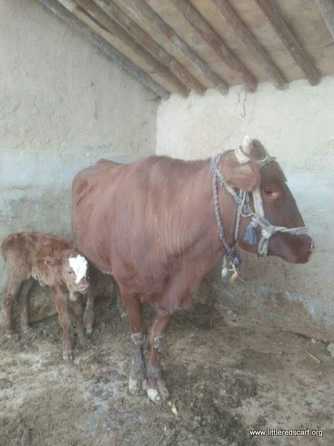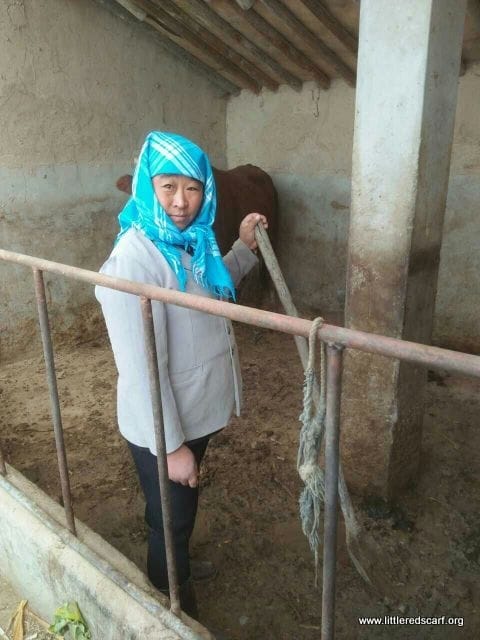|
Little Red Scarf is in Lanzhou, Gansu province and provides financial support and encouragement to children suffering from congenital heart disease. In addition, they provide families with post-operative care and help the children sustain a healthy lifestyle. Special thanks to Dean & Shwu-Hui Chang and Dr. Samuel So for donating $240 to support Cai Ping's domestic dream -- raising sheep and cattle. A year later, thanks to their support, Cai Ping’s dream has come to fruition! C36 Caiping: Caiping is a 2015 beneficiary of Little Red Scarf. The following information was exchanged over a phone call, in which we sought to understand Caiping’s current situation and the development of her project, which she described to us. Physical health: Caiping’s cough is still quite severe, and four days of intravenous therapy hasn’t improved her symptoms. She is now boiling 20 batches Chinese herbal medicine at home. The first half of the year had her feeling healthy, then sick, and the second half of the year has just been a repeat of the first. When Caiping went to Lanzhou in March to receive a heart examination, the doctor that she was not fully recovered. This was quite strange, as it has been three years since her operation, and doctors had previously told her that her recovery was going smoothly. I recommended that Cai Ping visit other hospitals and see if their prognoses differ. I also suggested that the she do a lung examination for her cough. Cai Ping’s husband felt back pain more often and over longer periods than last year. The couple’s poor health has meant that they can’t even farm all of their land. Of a total of eight acres of land, they rented out more than 7 acres, and work on the harvesting of 3 acres: 1 of potato, 1 of sesame, and 1 of corn. Potato is a staple for the family, as is sesame oil, so the cultivation of both crops is important to them. Corn is used to feed cattle, and flour, also a necessity, is purchased. Family situation: This year in July, the child's grandmother suddenly lost the ability to speak, and so she brought her grandmother to Lanzhou for a medical examination. The doctor said that her vocal cords were paralyzed. Upon hearing the medical fees required for treatment at the Lanzhou hospital, the family decided to bring the grandmother back to the local county hospital. After a month, the family saw no improvement and decided to bring her home. Now, she still cannot speak, but other aspects of her life are remained the same. She can go from the house to the yard in the sun, and when she feels unwell she occasionally visits the county hospital for intravenous therapy. Her daughter went to work as a restaurant waiter in Xinjiang this year, and earns 2,100 yuan per month, 1,200 yuan of which she sends to her parents. She once promised her parents she would provide money for medications each month. If they were to feel the slightest bit uncomfortable, they should not delay in seeking help. (We must offer her praise; despite her young age, she is so diligent and thoughtful, placing priority on helping her parents). Cai Ping’s son is in junior high school. Project status: The calf was eight months old when purchased, but did not eat the grass that Caiping fed it. After a month, Caiping decided to shell out 400 yuan to purchase a new calf. Now this calf is almost two years old and has matured into a healthy, sizeable adult cow. Caiping said that her cow is her greatest source of worry, and she spends her days deliberating about how to best raise the cow. The cow will be a mother soon, and Caiping and her family can’t wait for this day to come. The cow was originally set to deliver her calf in late November. On day near the end of October, some neighbors stopped by to ask Caiping if they could borrow her cow for some farmwork. Cai Ping told them to be careful and let them take the cow, as she thought there was still about a month until it was supposed to give birth. The neighbors did not dare let the cow work too hard, but less than three days after the cow was delivered back to Caiping, it gave birth to a calf a month early. Caiping and her husband were worried sick that the calf wouldn’t survive, but luckily it is in good health. Caiping wants to raise the calf for 5-6 months; if it grows into a healthy cow, she estimates that she can sell it for 4000-5000 yuan. If the customer tries to bargain, she can probably sell it for 2000-3000 yuan. No matter what, Caiping says that she will diligently raise the calf, and the family an extra source of income in 2017. Raising cows requires lots of cow feed, and in the village, corn is used most often. The one acre of corn that Caiping grows is not enough to feed her cows, but often other farmers give away extra corn, which Caiping and her husband will bring home in their handcart and use to feed their cows. The corn is usually processed with a machine, mixed with some glutinous rice flour and oil to increase nutritional value, then fed to the cows. In the morning the cows are fed corn soup, and lunch and dinner are dry corn. (Cattle get a year older every human year, and also have a pregnancy period of ten months. They give birth once a year.) Existing sources of income: In March they cancelled their welfare subsidy, which they have had for nine years. Caiping and her husband have no regrets, and feel grateful to have had it for as long as they did. As they lost a source of income, they now are fully reliant on the the 1200 yuan that their daughter sends them every month. The next milestone is income they will get from selling their calf. Original article written by Yunyun Jie, translated by Emma Cockerell, and edited by Yanyan Zhang and Carolyn D. Comments are closed.
|
TFISH FUND BLOGWe update news and reports directly from the field written by our NGO partners daily. Top PostsPHOTOS & VIDEOSIN THE NEWSCategories
All
Archives
August 2017
|




 RSS Feed
RSS Feed